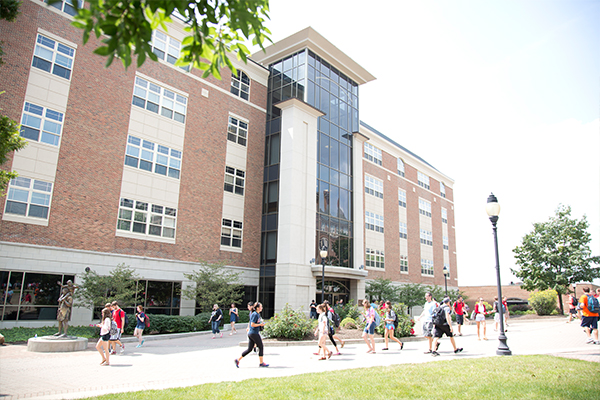Dayton Engineer

School of Engineering Students Help Mission of Mary Cooperative Become Net-Zero
By Elizabeth Skelin, marketing communications intern
With the help of School of Engineering programs and students, Mission of Mary Cooperative (MMC), an urban farming initiative, has been verified as a net-zero energy campus through the New Buildings Institute.
MMC addresses food insecurity for the city of Dayton through urban farming. As a small operation in the heart of the city, the partnership with the University of Dayton allows both parties to complete large-scale, significant projects. Meanwhile, students have the opportunity to engage their engineering skills on projects that drive community impact. Students work with community partners to tackle global challenges that affect Dayton.
“This milestone goes to show that through even minor changes, such as energy behavior improvements, an impact can be made...even small organizations like MMC can make a major impact if they are committed and willing to implement changes,” said Jaime Howard, a senior electrical engineering student.
Executive director of MMC, Michael Schulz ’07 said, "we are proving to our neighborhood and our city how sustainable development can support our operations in a way that respects nature, the needs of the neighborhood, and future generations - a transformation they hope becomes part of the fabric of Dayton.”
Between senior design projects with the Innovation Center and semester-long placements through ETHOS, University of Dayton students have been instrumental to MMC becoming net-zero. These placements allow students “to have practical, high-impact experiential learning opportunities and discover a passion for social and environmental justice,” said Katie O’Rourke, a fifth-year chemical engineering student.
Kelly Bohrer, director of community relations for the School of Engineering, noted that students have completed projects to achieve the net-zero goal, to improve processes and infrastructure, and to meet various aspects of MMC’s mission, from environmental education to organic farming.
The ETHOS Center and the Innovation Center have been able to match students with MMC to work on meaningful projects, bridging the gap between academia and real-world experience. Apart from tracking energy usage and helping MMC staff and volunteers change their energy consumption behaviors, students have also worked on automated controls for the greenhouse and helped community members increase their homes’ efficiency. Students noted learning many critical skills, such as communication, leadership, and analytical skills.
Howard took what she learned in class about energy analysis when she started working with MMC in 2019. Howard tracked energy generation and consumption in order to analyze trends and recommend areas for improvement. She also helped to install monitoring software for an educational energy kiosk.
“This partnership grants a space for students to focus on appropriate technology to apply on the site and allows students to develop cultural humility in the process,” Bohrer said.
Nathan Mansour, a fifth-year electrical engineering student, completed a semester of service at MMC through the ETHOS Center. He primarily used utility monitoring software to analyze power usage and increase efficiency in an effort to become a net zero energy organization. However, Mansour also helped to increase MMC’s growing capacity by building new greenhouses and simply helping the staff with farm work and packing vegetables.
Students looking to become involved with MMC will find unique experiential learning opportunities. The organization is open to student learning and welcomes student ideas that can help fulfill MMC’s mission of serving the community.
As Mansour said, “As a UD student, this is such a real way to connect with the city of Dayton.”
